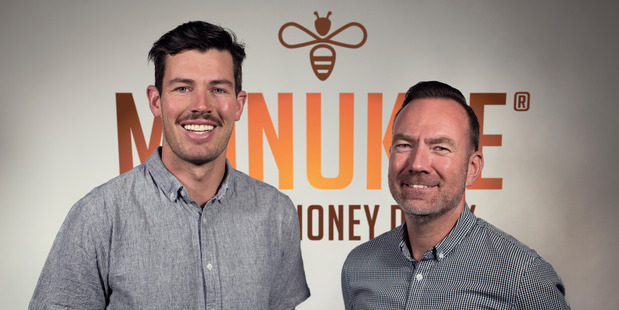

Manukee founder and “BeeEO” York Spencer talks about the challenges of selling his products in Asia and finding a distribution partner, all while making sure to keep the office vacuumed.
What does your business do?
Manukee is a UMF Manuka honey drink. We launched in July last year at the New Zealand Fine Food Show, and source all of our honey from the outskirts of the Tongariro National Park and our drinks are made in Auckland. We have two drinks on the market, each containing two teaspoons of Manuka honey.
What sparked the idea?
Five or six years ago I was wandering around the streets of Singapore, and I had this niggling feeling that Manuka honey was really inconvenient to find, buy and use, and so I wanted to give the world an easier way of consuming the benefits.
The motivation was a mix of passion for wanting to share Manuka honey with the world and wanting to do it in a different way to how it has traditionally been done. I wanted to disrupt the Manukau honey category.
How big is your team?
There are two of us, but we use a ‘hut and spoke’ model where a lot of manufacturing, marketing, service providers and other services we use are outsourced.
What have you been working on this year?
This year has really been about consolidating our position in the New Zealand market to build the authenticity of the brand and increase brand exposure. We’ve also been starting to develop our strategic export market in Asia; in Korea and Japan. It has taken us a lot of time to find the right partner in South Korea.
What are your long term plans for Manukee?
We want to be the world’s leading Manuka honey drinks company. We’ll always be a born in New Zealand, made in New Zealand product – that’s really important for us, but international expansion is where we are going to grow. We’re looking at new product development as we expand the portfolio.
What’s the hardest part about operating in food and beverage industry?
There’s a lot of financial pressure being a start up and I would say trying to keep an even keel during the massive highs and lows is the hardest thing. It’s trying to juggle the priorities, keeping an even keel in the face of adversity and making sure that we’re keeping a positive mindset to deliver on our ambitions.
How much competition are you facing?
There’s a huge amount of competition both locally and internationally for healthy beverages. To combat that competition we want to be first to market, and the other way we combat that competition is to make sure we have the right partner on the ground in each place. It’s really important because you’ve got to nail it all – right down to the right distribution and execute the sales channels you’re working in. The product is only half the battle – the other half of it is how we can win within the sales channel and connect with consumers.
How hard was it to pick distribution partners in Asia?
It’s a tough process. Essentially, at first it is desktop research, but then the other component is using the contacts in those markets. Even though I have experience in Asia and reasonably good contacts in those markets I still found it tough. We made a commitment to spend time on the ground, on the streets, in the market. I did four to five trips to Korea, and China, before we found a partner. Once we diged out partners we met them, assessed their capabilities, and worked through a process before landing those who had shared values, resources and man power.

What struggles have you faced so far in business?
Too many to list, but the top three would be the financial pressure of a startup, keeping an even keel in the face of massive highs and lows often on the same day, and getting stretched in so many completely diverse directions. I do everything from vacuuming the office, packing boxes at the production plant, sampling Manukee at local retailers, managing weekly cashflow, through to writing detailed business plans and negotiating investment opportunities with listed companies in Asia, and that’s usually all in the same week – but I love it.
What advice do you give to thinking of starting their own business?
Decide very early on if New Zealand or the international market is going to be your main focus, and that’ll help decide your strategy, offering and how you structure the business. You also need to decide if you are in the business of wants or needs – are you creating a product people need on a daily basis or want on a daily basis, because they are both different business models.
Find a niche, get there first, but make sure that niche is not too niche. It’s five per cent strategy and 95 per cent perspiration.
more recommended stories
 Frito-Lay® Introduces Cracker Jill™ to Support and Celebrate Women in Sports
Frito-Lay® Introduces Cracker Jill™ to Support and Celebrate Women in SportsApril 5, 2022 Cracker Jack®.
 Alcohol Sales Can Be The Difference Between Success And Failure
Alcohol Sales Can Be The Difference Between Success And FailureFor bars and restaurants, the bar.
 Why Are Beef Prices and Demand Up, But Cattle Prices Down?
Why Are Beef Prices and Demand Up, But Cattle Prices Down?Dan Nosowitz Some ranchers and politicians.
 Cow Appreciation Day Tuesday, July 9, 2019 – Chick-fil-A
Cow Appreciation Day Tuesday, July 9, 2019 – Chick-fil-AWhat is Cow Appreciation Day? Cow.
 Ben & Jerry’s Plans A CBD-Infused Ice Cream, Pending FDA Approval
Ben & Jerry’s Plans A CBD-Infused Ice Cream, Pending FDA ApprovalBen & Jerry’s said Thursday it’s.
 Jack & Coke Popsicles Will Be The Official Drunk Snack Of Summer
Jack & Coke Popsicles Will Be The Official Drunk Snack Of SummerMICHAEL PATTERSON Summer (and spring), hurry.
